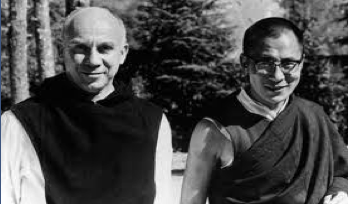Thomas Merton
Thomas Merton with the Dalai Lama at Dharamsala on 4 Nov, 1968 (Photo courtesy Chris Pramuk)
There are times in our lives when we meet someone more deeply. This week I met Thomas Merton in this way. And I am so grateful. I am appreciative too that I have been introduced to him by scholar and theologian Dr Chris Pramuk from Colorada.
Being a religious myself, I have some sense of what religious life involves, at least Marist religious life. During this week I learnt something of Cistercian religious life and how it enabled Fr Thomas Merton to lead such a fulfilling life. This experience of meeting Thomas Merton unfolded for me at Mittagong, south of Sydney, where twenty five of us accepted an invitation from the Marist Association of St Marcellin Champagnat to participate in a three day retreat, praying in the spirit of Thomas Merton. We were blessed to be guided by such a Merton devotee as Chris Pramuk.
Chris began by introducing us to the key stages in Merton’s life. Born in France in 1915, Merton's family moved later that year to the United States. They returned to France and then went to England in 1928 where Thomas attended school and later Cambridge University. In 1935, Merton enrolled at Columbia University where he discovered Catholicism, being baptised in 1938. Feeling his call to the religious life, Merton was accepted into the Abbey of Gethsemani as a novice in 1941. In 1947 he took his solemn vows, committing himself to live out his life at the monastery as a cistercian monk. He was ordained a priest in 1949. In 1968, Merton's abbot allowed him to take a tour of Asia during which he met the Dalai Lama in India on three occasions. There he died on 10 December, 1968.
Much has been written about Merton’s life, his ideas and passions. During this retreat Chris stressed Merton’s love of music, poetry and painting. In this context, he referred to the last General of the Society of Jesus, Fr Adolfo Nicolas who states
We are not in education for proselytism, but for transformation. We want to form a new kind of humanity that is musical, that retains this sensitivity to beauty, to goodness, to the suffering of others, to compassion. The education of our hearts begins with silence.
Chris then shared some of his own love of music, having begun playing the piano as a nine year old and growing to find music 'introduced him to mystery' helping him 'to touch the eternal'. This personal love of music seems to have given Chris a deeper appreciation of Thomas Merton, as does his deep knowledge of theological thinkers of this time. Of particular interest to Marists is Merton’s references to Mary. This came in the latter part of Merton’s life when he was focussing more keenly on the coming together of East and West.
Over this retreat I have grown to admire the way Merton publicly addressed the issues of the day. Feeling the support of his Cistercian community and comforted by his contemplative approach, Merton engaged with the world well before this was emphasised by Vatican 11. People are drawn to Merton, particularly by his transparency about his failures.
Chris Pramuk
By the time Merton died in 1968 he had shown us a way of living as an engaged Christian. He clearly loved people and his community loved him, especially the novices he guided. We have much to learn from this prophetic and loving man of God.
John McMahon




